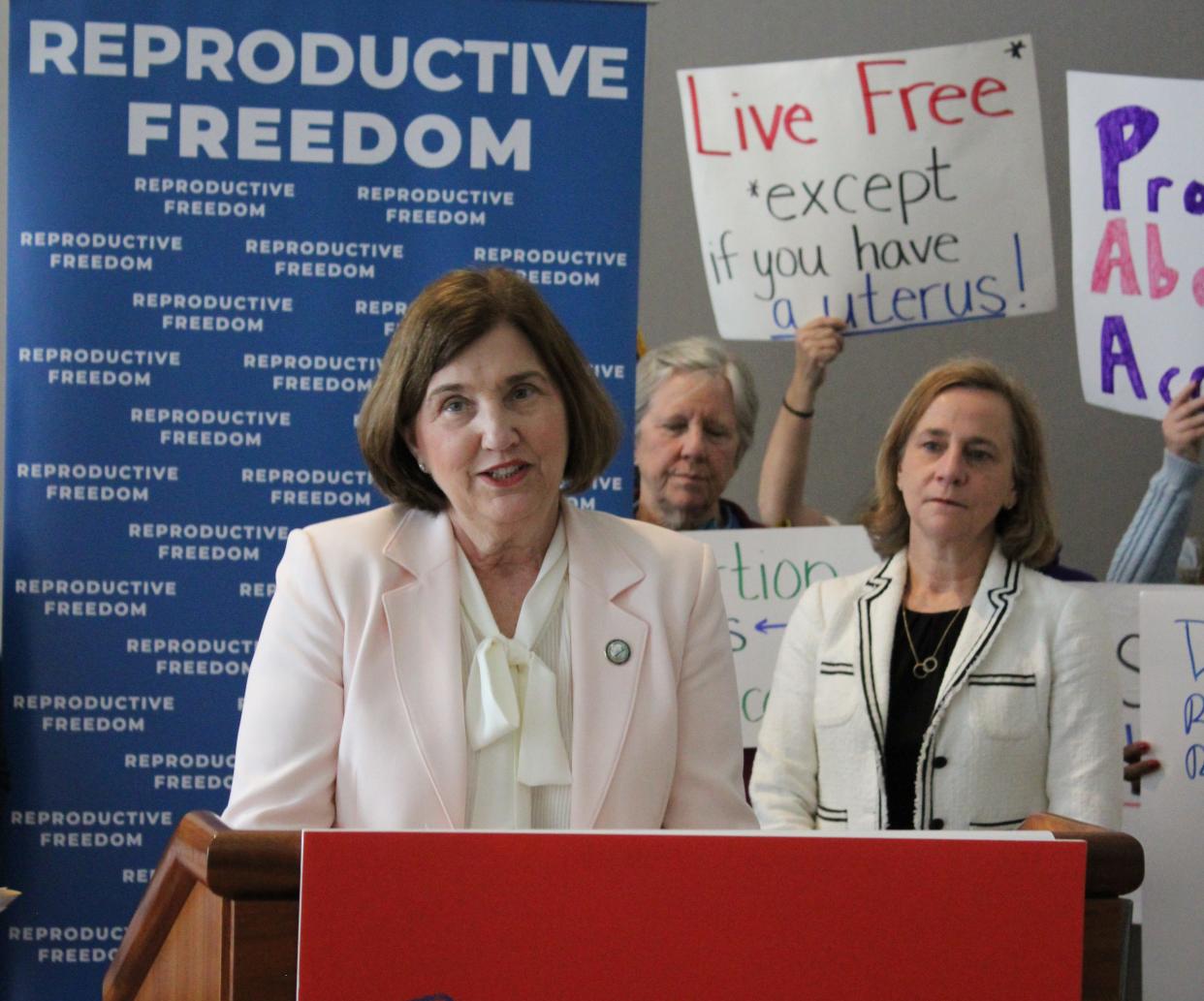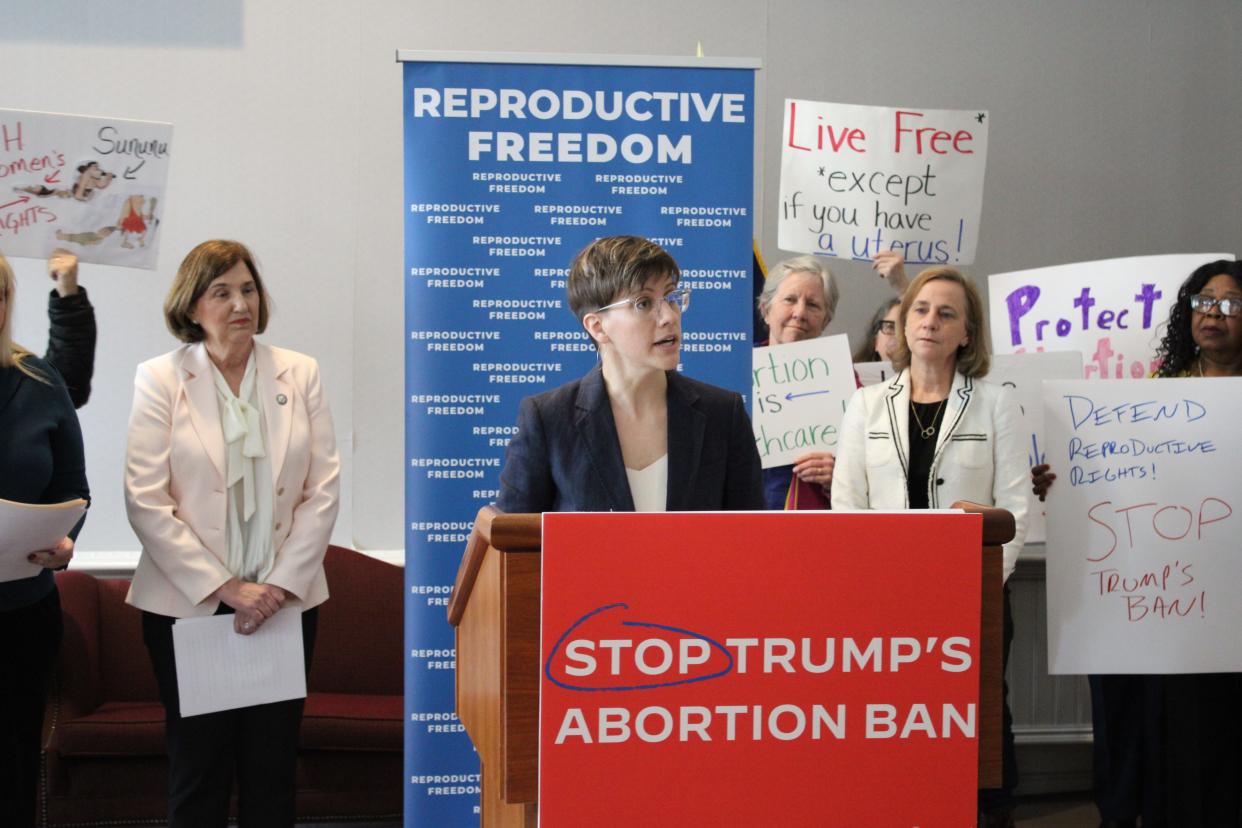NH Democrats seize on abortion issue to attack Republicans. GOP candidates push back.
CONCORD — New Hampshire Democratic gubernatorial candidates Joyce Craig and Cinde Warmington joined forces on Wednesday to slam former President Donald Trump as well as their Republican opponents Kelly Ayotte and Chuck Morse over recent restrictions placed on reproductive healthcare.
Democrats are seizing on major developments related to abortion in order to make their case for election in 2024.
The press conference comes after Trump said individual states should decide their own abortion laws and a subsequent ruling from the Arizona Supreme Court that upheld an 1864 abortion ban.

Craig and Warmington appearing together was a rare occurrence in a heated campaign against each other to become the Democratic nominee. They were joined Wednesday by New Hampshire state Senate Democratic leader Donna Soucy, D-Manchester, and Dr. Maris Toland, an obstetrician/gynecologist.
Craig and Warmington attack. Ayotte and Morse call it 'lies' and 'grandstanding.'
Craig and Warmington asserted that Republicans like Trump, Ayotte, and Morse cannot be trusted on the issue of reproductive health.
“We know that Kelly Ayotte and Donald Trump will be a threat to women's health and our ability to access abortion because of their extreme track records,” said Warmington.
Craig said what happened in Arizona “could happen in New Hampshire.”
“it is critically important who the governor is in a state when abortion is at the state level. We need to make sure for our state that we codify access to abortion. New Hampshire is the only state in New England that hasn't,” said Craig.
Both Warmington and Craig said that Ayotte’s record in the U.S. Senate, where she voted for restrictions on abortion, shows that she “cannot be trusted” on this issue or on her “recent statements.”
Ayotte, contacted for comment Wednesday, pushed back against what Democrats are saying about her.
“I’ll tell you what you won’t hear from either of my opponents today: the truth. Rather than put forward a positive vision for how they would lead our state, or where they stand on a host of issues, all we hear are misleading attacks and outright lies,” Ayotte said in a prepared statement. “The truth is, I will be a champion for women — I have made it clear that I will fight for increased funding for women’s healthcare, protect Granite State families’ access to IVF, and support New Hampshire’s current law which protects women’s freedom to obtain an abortion for any reason up to six months of pregnancy.”
Ayotte said she supports and will not change New Hampshire’s current 24-week abortion law.
Morse provided a similar statement.
"No matter how much grandstanding Democrats do on this issue, the fact remains: abortion is legal and safe in New Hampshire for the first six months of pregnancy, and it will stay that way when I'm governor,” Morse said.
More: Ayotte and Morse seek Republican nomination for NH governor: What voters need to know
More: Craig and Warmington seek Democratic nomination for governor. What voters need to know.
Republican Gov. Chris Sununu did not return a request for comment. He signed New Hampshire’s current abortion rule into law in 2022.
NH House hears bill on abortion drugs
Also on Wednesday, the New Hampshire House committee on Health, Human Services, and Elderly Affairs discussed Senate Bill 567, which would direct the commissioner of the department of health and human services to compile a report on the availability of mifepristone and misoprostol by Nov. 1, 2024.
Mifepristone is one of two pills taken in a medication abortion, the other being misoprostol. Mifepristone was approved by the FDA more than 20 years ago, and the medications are used by more than half of the people who get legal abortions in the United States.
The bill, sponsored by Sen. Becky Whitley, D-Hopkinton, was passed by the Senate by a voice vote in February. At the time, Kayla Montgomery, the vice president for public affairs for Planned Parenthood of Northern New England, said they were “encouraged to see bipartisan support for establishing a state plan to respond to the upcoming Supreme Court decision on Mifepristone.”
In FDA v. Alliance for Hippocratic Medicine, the Supreme Court will decide whether to revoke the FDA’s approval of mifepristone. If it does, access to the pill will be severely restricted, even in states where abortion is still legal.
In the House, Whitley testified her bill would help identify potential actions or barriers to protecting and expanding access to the pills, as well as ways to increase outreach and education about access.
“The legislature of the state of New Hampshire has actually recognized already the importance of access to mifepristone since 1991, when New Hampshire was the first state in the nation to adopt a state resolution urging the U.S. Food and Drug Administration to allow clinical trials of mifepristone in medication abortions,” Whitley said.
At the press conference, Dr. Toland said that mifepristone is not just an abortion pill, but a “crucial piece of medical treatment for early pregnancy loss or miscarriage.”

“When having an early pregnancy loss or a miscarriage, which happens to about 20 to 25% of all patients who are trying to get pregnant, the medication addition of mifepristone as part of the treatment for that decreases the risk of hemorrhage by up to 60%,” Toland said. “Banning that medication does not just affect abortion, it affects all women's health care. It affects pregnancy care, and it affects early pregnancy care. And it will cause harm to the women of this country.”
The Supreme Court has seemed inclined to uphold access to the mifepristone, questioning the arguments that anyone faces moral harm from the availability of the pill. The justices were also hesitant to second-guess the FDA’s judgement the drug is safe. The Supreme Court is expected to issue a decision by the end of June.
This article originally appeared on Portsmouth Herald: Abortion issue attack: NH Dems Joyce Craig, Cinde Warmington unite
